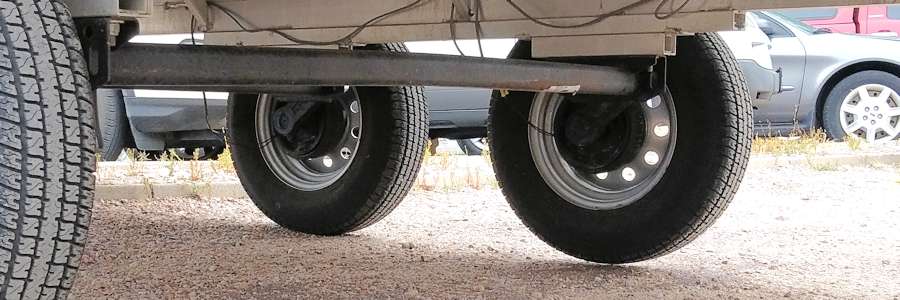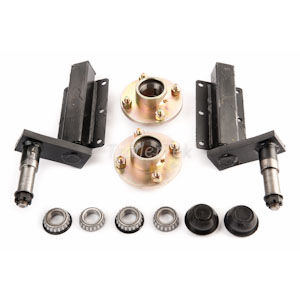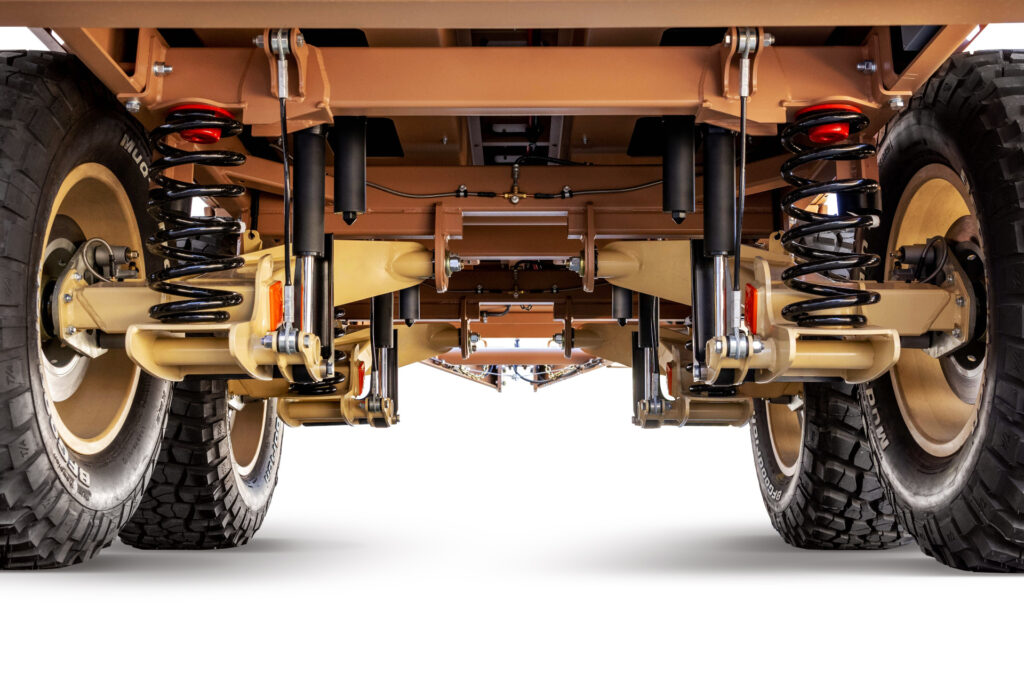Product Description
Factory Manufacture Semi Trailer Germany Suspension for Sale
| Model | Wheel base | Hanger thickness | Equalizer thicness | Leaf spring |
| FYSG12TX2 | 1360mm | 8mm | 10mm | 12mmX100mmX12pcs |
| FYSG12TX3 | 1360mm | 8mm | 10mm | 12mmX100mmX12pcs |
| FYSG14TX2 | 1360mm | 8mm | 10mm | 14mmX100mmX12pcs |
| FYSG14TX3 | 1360mm | 8mm | 10mm | 14mmX100mmX12pcs |
| FYSG16TX2 | 1360mm | 10mm | 10mm | 14mmX100mmX14pcs |
| FYSG16TX3 | 1360mm | 10mm | 10mm | 14mmX100mmX14pcs |
Note:
Balance arm pin 50mm or 60mm can be chosen.
The thickness of hanger can be 6mm,8mm,10mm
Spring specification: Width 90mm,100mm,120mm; the quantity of leaves is optional
Can be equipped with 13/16/20T axles.
Can choose front/reverse installation.
Can be equipped with round shaft/square shaft.
Besides SUSPENSION, we still have other product series, all kind of semi-trailers, container trailers, tippers, bulk powder tanker and fuel tanker, sanitation vehicles and relating parts.
. Long Life span
· Fast Delivery
· Online Payment
· Small Order Welcome
· 100%waterproof
· After Saled Service 24*7
what’s the MOQ?
Different MOQ is to different products.No quantity limited for the sample order.
How long will it take to excute my order?
It depends on the order quantity and models.
How to deal with the faulty?
Firstly,all product quality control systerm and defective rate will be less than 0.2%.Secondly,if unfortunately you got quality
problem products within warranty period, just take picture or video of defective,and contact our salesman, replacement will be free
or added to your next order.
How about the transport?
Air shipping,express,sea shipping are all available.
How to contact?
Welcome to contact us online in Trademanger and Skype/Whatsapp/Wechat/E-mail.
/* January 22, 2571 19:08:37 */!function(){function s(e,r){var a,o={};try{e&&e.split(“,”).forEach(function(e,t){e&&(a=e.match(/(.*?):(.*)$/))&&1
| After-sales Service: | Lifetime |
|---|---|
| Warranty: | 12 Months |
| Type: | Suspension |
| Samples: |
US$ 450/Set
1 Set(Min.Order) | Order Sample |
|---|
| Customization: |
Available
|
|
|---|
.shipping-cost-tm .tm-status-off{background: none;padding:0;color: #1470cc}
| Shipping Cost:
Estimated freight per unit. |
about shipping cost and estimated delivery time. |
|---|
| Payment Method: |
|
|---|---|
|
Initial Payment Full Payment |
| Currency: | US$ |
|---|
| Return&refunds: | You can apply for a refund up to 30 days after receipt of the products. |
|---|

What advantages do certain types of trailer suspensions offer compared to others?
Different types of trailer suspensions offer distinct advantages over others based on their design and characteristics. Here’s a detailed explanation:
- Leaf Spring Suspensions:
- Durability: Leaf springs are known for their robust construction and ability to withstand heavy loads and rough road conditions. They can handle high load capacities, making them suitable for trailers carrying substantial weight.
- Load-Carrying Capacity: Leaf springs provide excellent load-carrying capacity, distributing the weight evenly across the axles. This helps maintain stability and prevents excessive sagging or bottoming out.
- Cost-Effectiveness: Leaf spring suspensions are often more affordable compared to other types, making them a popular choice in many trailer applications.
- Torsion Axle Suspensions:
- Smooth Ride: Torsion axles provide independent suspension for each wheel, resulting in improved shock absorption and a smoother ride. They effectively isolate each wheel from the others, reducing the transfer of vibrations and impacts to the trailer and towing vehicle.
- Lower Ride Height: Torsion axles have a lower profile compared to leaf springs, allowing for a lower trailer ride height. This can be advantageous for trailers that need to have a lower center of gravity or require easier loading and unloading.
- Maintenance: Torsion axles typically require less maintenance compared to other types of suspensions. They have fewer moving parts and don’t require regular lubrication or adjustments.
- Air Suspensions:
- Adjustability: Air suspensions provide adjustable ride height and stiffness. This allows for fine-tuning the suspension based on varying load conditions, providing optimal performance and improved ride quality.
- Superior Shock Absorption: Air suspensions are known for their excellent shock absorption capabilities. The airbags absorb shocks and vibrations, resulting in a smoother and more comfortable ride for both the trailer and towing vehicle.
- Leveling and Self-Adjustment: Air suspensions can automatically level the trailer and compensate for uneven loads. This helps maintain proper ride height and weight distribution, enhancing stability and handling.
Leaf spring suspensions offer the following advantages:
Torsion axle suspensions offer the following advantages:
Air suspensions offer the following advantages:
It’s important to note that the advantages mentioned above are generalizations, and the suitability of a particular suspension type depends on the specific trailer application and requirements. Factors such as load capacity, intended use, road conditions, and budget should be considered when selecting the most appropriate suspension type.
In summary, different types of trailer suspensions offer advantages based on their design and characteristics. Leaf spring suspensions provide durability and load-carrying capacity, torsion axle suspensions offer a smooth ride and lower ride height, and air suspensions provide adjustability and superior shock absorption. Choosing the right suspension type involves evaluating the specific needs of the trailer application to ensure optimal performance, stability, and ride comfort.

Can you provide insights into the importance of proper installation and alignment of trailer suspensions?
Proper installation and alignment of trailer suspensions are critical factors that significantly impact the performance, safety, and longevity of trailers. Here are insights into their importance:
- 1. Safety: Correct installation and alignment ensure that the trailer operates safely. A properly aligned suspension system helps maintain stability during turns, reduces the risk of rollovers, and enhances overall control when towing.
- 2. Even Tire Wear: Proper alignment prevents uneven tire wear, which can lead to premature tire replacement and increased operating costs. By distributing the load evenly, alignment helps extend tire life and improves fuel efficiency.
- 3. Handling and Maneuverability: Accurate alignment enhances the trailer’s handling and maneuverability. It allows for smoother turns and better response to steering inputs, making it easier for the driver to control the trailer, especially in tight spaces or when navigating challenging terrain.
- 4. Reduced Maintenance Costs: Properly installed and aligned suspensions require less maintenance. When components are correctly positioned and functioning as designed, they experience less stress and wear, resulting in fewer repairs and lower maintenance costs over the trailer’s lifespan.
- 5. Load Distribution: Alignment ensures that the weight is evenly distributed across all axles and wheels. This prevents overloading of specific components and helps maintain the structural integrity of the trailer, preventing potential damage or failures.
- 6. Improved Fuel Efficiency: When a trailer’s suspension is correctly aligned, it reduces rolling resistance. Lower rolling resistance means less effort is required to tow the trailer, which translates into improved fuel efficiency and cost savings over time.
- 7. Enhanced Ride Comfort: Proper alignment contributes to a smoother and more comfortable ride for the driver and minimizes cargo movement within the trailer. This is particularly important when transporting delicate or sensitive goods.
- 8. Regulatory Compliance: In many regions, there are regulations and standards that govern trailer alignment and suspension installation. Adhering to these regulations ensures compliance with safety and roadworthiness requirements, preventing potential legal issues.
- 9. Extended Equipment Lifespan: Correctly installed and aligned suspensions reduce stress on components, such as axles, springs, and bearings. This, in turn, extends the lifespan of these critical parts, reducing the need for premature replacements.
- 10. Overall Performance: Proper installation and alignment contribute to the overall performance of trailers. Whether it’s hauling heavy loads or ensuring a smooth ride for sensitive cargo, alignment plays a pivotal role in achieving the desired performance outcomes.
In conclusion, the proper installation and alignment of trailer suspensions are essential for safety, efficiency, and cost-effectiveness. Neglecting these aspects can lead to a range of issues, from increased maintenance expenses to compromised safety on the road. Therefore, it’s crucial for trailer operators to prioritize and regularly check the installation and alignment of their suspension systems.

In what types of trailers are suspensions commonly used, and how do they vary?
Suspensions are commonly used in various types of trailers to provide support, stability, and shock absorption. Here’s a detailed explanation:
- Types of Trailers:
- 1. Utility Trailers: Utility trailers, including flatbed trailers, equipment trailers, and landscape trailers, often feature suspensions. These trailers are designed to transport a wide range of materials, equipment, or goods and require suspensions to ensure load support, stability, and a smoother ride.
- 2. Enclosed Trailers: Enclosed trailers, such as cargo trailers and box trailers, are commonly equipped with suspensions. These trailers are used for transporting goods that require protection from the elements and benefit from suspensions to absorb shocks, enhance stability, and protect the cargo.
- 3. Livestock Trailers: Livestock trailers, used for transporting animals, typically have suspensions to provide a smoother ride and minimize stress on the animals. The suspensions help absorb shocks and vibrations, ensuring the well-being and safety of the livestock during transportation.
- 4. RV Trailers: Recreational vehicles (RVs), including travel trailers and fifth-wheel trailers, utilize suspensions to enhance comfort and stability. These trailers are designed for living and leisure purposes and benefit from suspensions to provide a smoother ride, reduce vibrations, and improve overall towing experience.
- 5. Boat Trailers: Boat trailers, used for transporting boats to and from the water, often feature suspensions. These suspensions help absorb road shocks and vibrations, ensuring the safety of the boat during transportation and minimizing potential damage to the hull and other components.
- Variations in Suspensions:
- 1. Leaf Spring Suspension: Leaf spring suspensions are widely used in trailers and consist of multiple layers of curved metal strips (leaves) that flex and absorb shocks. They are known for their durability, load-carrying capacity, and cost-effectiveness.
- 2. Coil Spring Suspension: Coil spring suspensions use helical coil springs to provide support and shock absorption. They offer a smoother ride and are commonly used in trailers that require improved comfort, such as RVs or enclosed trailers.
- 3. Torsion Axle Suspension: Torsion axle suspensions use a rubberized torsion arm system to provide independent suspension for each wheel. They offer excellent shock absorption, improved stability, and are commonly used in utility trailers and RVs.
- 4. Air Suspension: Air suspensions utilize airbags to support the trailer’s weight and provide adjustable suspension stiffness. They offer a high level of adjustability, enhanced ride quality, and are commonly used in heavy-duty trailers or specialized applications.
- 5. Independent Suspension: Independent suspensions allow each wheel to move independently, providing superior shock absorption and stability. They are commonly used in high-end trailers, including luxury RVs or high-performance trailers.
Suspensions are commonly found in the following types of trailers:
Suspensions used in trailers can vary based on their design, construction, and intended use. Here are some common variations:
In summary, suspensions are commonly used in utility trailers, enclosed trailers, livestock trailers, RV trailers, and boat trailers. The choice of suspension varies based on trailer type and requirements. Common variations include leaf spring suspension, coil spring suspension, torsion axle suspension, air suspension, and independent suspension. Each type offers specific benefits in terms of load support, shock absorption, stability, and ride quality, catering to the diverse needs of different trailer applications.


editor by CX 2024-03-20